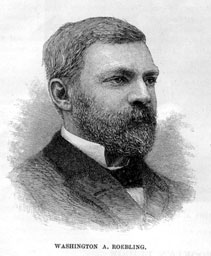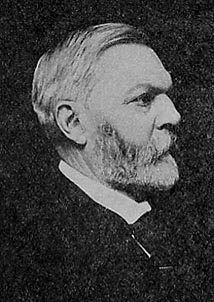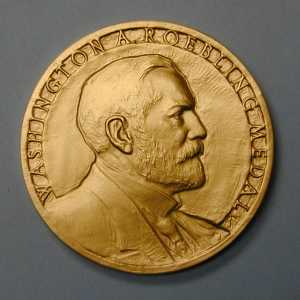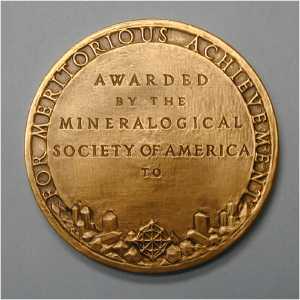 W. A. Roebling, 1883, Harper's Weekly
W. A. Roebling, 1883, Harper's Weekly
 Roebling, 1926, American Mineralogist
Roebling, 1926, American Mineralogist
Mineralogical Society of America, Founded December 30, 1919
revised 01/10/2022
The Roebling Medal is the highest award of the Mineralogical Society of America (MSA) for scientific eminence as represented primarily by scientific publication of outstanding original research in mineralogy. The science of mineralogy is defined broadly for purposes of the Roebling Medal, and a candidate need not qualify as a mineralogist; rather his or her published research should be related to the mineralogical sciences and should make some outstanding contribution to them. Service to mineralogy, teaching, and administrative accomplishment are not to be considered primary merit for the award. The nomination needs to be supported by the nominee’s published work. The award is not restricted to U.S. citizens. Nationality, personality, age of candidate, or place of employment shall not be considered for the award; however, current members of MSA Council are not eligible to be considered for the award.
 W. A. Roebling, 1883, Harper's Weekly
W. A. Roebling, 1883, Harper's Weekly
 Roebling, 1926, American Mineralogist
Roebling, 1926, American Mineralogist
The first ten years of the Society were reviewed at the Society's 1929 annual meeting. It was concluded that it would be very helpful if the Society had the means to establish awards to be given to outstanding investigators in America or abroad, or to the authors of contributions judged as noteworthy. The hope was that the recipient of an MSA medal or prize would be recognized as a signal honor. The MSA Council agreed that it would be eminently fitting to make provision for a medal in honor of Colonel Washington A. Roebling (1837-1926), engineer, bridge builder, mineral collector, and significant friend of the Society. A fund was established and annual additions were made to it from the treasury until the amount was sufficient to make the first award. The first award could be made in 1937.
Colonel Roebling first became interested in minerals while a student at the Rensselaer Polytechnic institute, Troy, NY. It was during the period of long convalescence from the bends, developed during work on the caisson of the Brooklyn Bridge, that his interest in minerals intensified. This interest continued during the remainder of his life and resulted in an unusually excellent collection numbering about 16,000 specimens. Many of the newer and rarer minerals were represented by type material. Colonel Roebling freely permitted his specimens to be used for scientific purposes, and in this way he contributed directly to the publication of many important papers. Following his death on July 21, 1926, his son, John A. Roebling, presented his collection and an endowment to maintain it to the National History Museum, Smithsonian Institution, Washington, DC. Of the firmly established 1500 known mineral species of the time, the Roebling collection lacked less than 15 of those.
Immediately after its founding in 1919, Colonel Roebling became identified with the Mineralogical Society of America. In 1924 he served as Vice-President. He followed the development of the Society with keen interest and was much concerned that it should grow in strength and influence. To assist in attaining these goals, Colonel Roebling made a substantial gift to the Society shortly before his death. The naming of the Roebling Medal expresses MSA's great appreciation of his significant contributions to mineralogy and to the furtherance of the objectives of the Society. It was hoped that the award would not only keep the memory of Washington A. Roebling alive, but that the medal would come to signify the highest recognition of achievement mineralogy can bestow.
References


With Links to the Presentation (P) and Acceptance (A) Articles
|
1937 Charles Palache P, A 1938 Waldemar T. Schaller P, A pic 1940 Leonard James Spencer P, A 1941 Esper S. Larsen, Jr. P, A pic 1945 Edward H. Kraus P, A 1946 Clarence S. Ross P, A 1947 Paul Niggli P, A 1948 William Lawrence Bragg P, A 1949 Herbert E. Merwin P, A 1950 Norman L. Bowen A 1952 Frederick E. Wright P & A 1953 William F. Foshag P & A 1954 Cecil Edgar Tilley P, A 1955 Alexander N. Winchell P, A 1956 Arthur F. Buddington P, A 1957 Walter F. Hunt P, A 1958 Martin J. Buerger P, A 1959 Felix Machatschki P, A 1960 Tom F.W. Barth P, A 1961 Paul Ramdohr P, A 1962 John W. Gruner P, A 1963 John Frank Schairer P, A 1964 Clifford Frondel P, A 1965 Adolf Pabst P, A 1966 Max H. Hey P, A 1967 Linus Pauling P, A 1968 Tei-ichi Ito P, A |
1969 Fritz Laves P,
A 1970 George W. Brindley P, A 1971 J.D.H. Donnay P, A 1972 Elburt F. Osborn P, A 1973 George Tunell P, A 1974 Ralph E. Grim P, A 1975 Michael Fleischer P, A 1975 O. Frank Tuttle P, A 1976 Carl W. Correns P, A 1977 Raimond Castaing P, A 1978 James B. Thompson P, A 1979 W.H. Taylor P, A 1980 Dmitrii S. Korzhinskii P, A 1981 Robert M. Garrels P, A 1982 Joseph V. Smith P, A 1983 Hans P. Eugster P, A 1984 Paul B. Barton, Jr. P, A 1985 Francis J. Turner P, A 1986 Edwin Roedder P, A 1987 Gerald V. Gibbs P, A 1988 Julian R. Goldsmith P, A 1989 Helen D. Megaw P, A 1990 Sturges W. Bailey P, A 1991 E-An Zen P, A 1992 Hatten S. Yoder, Jr. P, A 1993 Brian Mason P, A 1994 William A. Bassett P, A |
1995 William S. Fyfe P, A 1996 Donald H. Lindsley P, A 1997 Ian Carmichael P, A 1998 C. Wayne Burnham P, A 1999 Ikuo Kushiro P, A 2000 Robert C. Reynolds, Jr. P, A 2001 Peter J. Wyllie P, A 2002 Werner F. Schreyer P, A 2003 Charles T. Prewitt P, A 2004 Francis R. (Joe) Boyd P, A 2005 Ho-kwang Mao P, A 2006 W. Gary Ernst P, A 2007 Gordon E. Brown, Jr. P, A 2008 Bernard W. Evans P, A 2009 Alexandra Navrotsky P, A 2010 Robert C. Newton P, A 2011 Juhn G. (Louie) Liou P, A 2012 Harry W. Green, II P, A 2013 Frank C. Hawthorne P, A 2014 Bernard J. Wood P, A 2015 Rodney C. Ewing P, A 2016 Robert M. Hazen P, A Lecture 2017 Edward M. Stolper P, A 2018 E. Bruce Watson P, A Lecture 2019 Peter R. Buseck 2020 Andrew Putnis 2021 George R. Rossman 2022 John Valley 2023 Georges Calas |
PLEASE GO TO THE NEW MSA WEBSITE AT WWW.MSAWEB.ORG FOR THE CURRENT NOMINATION GUIDELINES AND DEADLINES.